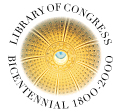


Public
Affairs Office
101 Independence Ave. SE
Washington DC 20540-1610
tel (202) 707-2905
fax (202) 707-9199
email pao@loc.gov
October 2, 2000
Contact: Guy Lamolinara, Library of Congress (202) 707-9217
Nita Dean, OCLC (614) 761-5002
Jennifer Hartzell, Research Libraries Group (650) 691-2207
Library of Congress, Other U.S. Libraries Join International Community on Use of Pinyin
Beginning October 1, American libraries will join the international community in using Pinyin as the standard romanization scheme for Chinese characters. The Wade-Giles romanization system, followed in American libraries for the last century, will no longer be used. In Pinyin, for example, the former Chinese leader is called "Mao Zedong," as opposed to "Mao Tse-tung" under Wade-Giles; "Qing dynasty" (Pinyin) will be used, rather than "Ch'ing." Now, the Library of Congress and other U.S. libraries are synchronized with the romanization used by other U.S. government agencies, including the Board of Geographic Names -- the body that governs the form of geographic names used in Library of Congress cataloging.
Associate Librarian for Library Services Winston Tabb said, "I am elated that the Library of Congress and the American library community can now embrace an international standard that will facilitate access to Chinese materials for scholars everywhere. This stands as a major accomplishment and another excellent example of the longstanding cooperation among the Library, OCLC and the Research Libraries Group that has benefited libraries and our users throughout the world. I am extremely pleased that the Library can at last incorporate this important standardization into our cataloging activities."
In making the change to Pinyin, the Library collaborated with OCLC and the Research Libraries Group (RLG) to address the conversion of the millions of Chinese-language bibliographic records in their respective databases romanized according to Wade-Giles, including the headings established from Chinese works that exist in non-Chinese records (e.g., translations of works by Mao Zedong).
"The adoption of a single romanization scheme will enhance the flow of information around the world, helping both librarians and library users wherever they are," said Jay Jordan, OCLC president and chief executive officer. "We are particularly pleased to participate in this collaborative effort and contribute to this important conversion."
"All of us were ready to work together, and once the Library of Congress set the changeover date, collaboration distinguished the entire effort," said James Michalko, president of the Research Libraries Group. "We've focused on ensuring a successful outcome, with encouragement and good advice from the community -- particularly the Council on East Asian Libraries and libraries that evaluated sample conversions of their own records."
The move to Pinyin represents two years of planning and coordination among the Library, OCLC and RLG. The three organizations hosted a series of open forums in conjunction with American Library Association conferences and meetings of other professional organizations to solicit input and to keep interested stakeholders informed of conversion plans. The Library took responsibility for mounting and maintaining the "Pinyin Project" Web site, where changes to the romanization rules, a coordinated timeline and other relevant information were shared with the library community in a timely fashion.
The successful implementation of the Pinyin standard is a testament to the collaborative spirit among the staff of the Library, OCLC and RLG. Staff freely shared the specifications drafted at the Library and applied by OCLC and RLG for the conversion of authority records and bibliographic records, respectively. Representatives engaged in review and revisions until the specifications yielded acceptable test results.
OCLC completed the conversion of the affected authority records on time, enabling them to be loaded at the Library and subsequently distributed by its Cataloging Distribution Service during the week of October 1. RLG will load the converted authority records for its users.
RLG took on the task of converting Library of Congress bibliographic records, using the Library's specifications. By revising the specifications based on comments of RLG members on test conversions of samples of their own records, the same specifications could be used on all RLG libraries' records. The full set of converted records was sent to both the Library and OCLC to be loaded for their constituents.
The implementors expect a transition period of one year, through October 1, 2001. By that date, catalog users will no longer have to be familiar with two different romanization schemes to access Chinese authors, titles or subject headings.
The Library of Congress is the largest library in the world, with more than 119 million items in collections in all formats and more than 460 languages. Its primary mission is to serve the U.S. Congress. It also serves the nation in its 22 reading rooms on Capitol Hill and through its popular Web site www.loc.gov.
Headquartered in Dublin, Ohio, OCLC Online Computer Library Center (www.oclc.org) is a nonprofit organization that provides computer- based cataloging, reference, resource sharing and preservation services to 37,000 libraries in 76 countries and territories. OCLC was founded in 1967 to improve access to the world's information and reduce information costs, and it conducts ongoing research to develop technologies to support that mission. Forest Press, a division of OCLC since 1988, publishes the Dewey Decimal Classification system.
The Research Libraries Group (www.rlg.org/toc.html) is a not-for-profit membership corporation of more than 160 universities, national libraries, archives, historical societies and other institutions devoted to the mission of "improving access to information that supports research and learning." In addition to a range of collaborative activities that address members' shared goals, RLG develops and operates databases and software to serve the information needs of member and nonmember institutions and individuals around the world.
More information about the joint Library of Congress/OCLC/RLG Pinyin Conversion Project, including background documents, timeline and FAQ, is available on the Pinyin home page at: www.loc.gov/catdir/pinyin/pinyin.html.
# # #
PR 00-141
10/2/00
ISSN 0731-3527